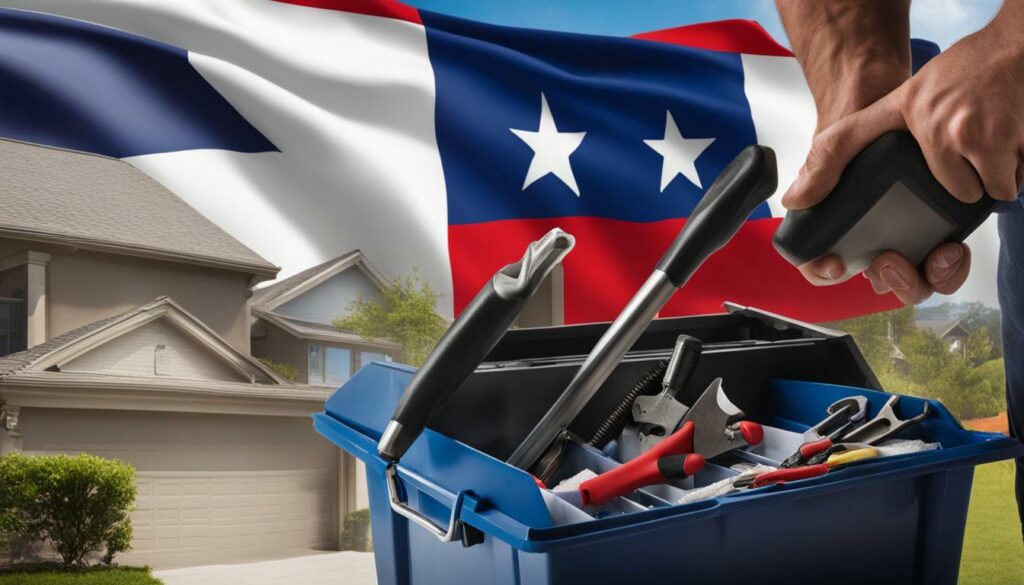
As a handyman service provider or client in Texas, you may be wondering whether or not these services are taxable. Understanding the tax regulations for handyman services in Texas is important to ensure compliance and avoid any potential issues with the tax authorities.
In this comprehensive guide, we will explore the tax implications for handyman services in Texas. We will cover tax laws, sales tax, taxable vs. non-taxable services, reporting and paying taxes, and any exemptions or deductions that may be applicable.
- Handyman services may be subject to taxes in Texas.
- Sales tax may apply to handyman services in Texas, depending on the type of service provided.
- It is important to differentiate between taxable and non-taxable handyman services to accurately calculate tax obligations.
- Understanding reporting and paying taxes for handyman services in Texas is crucial for compliance.
- There may be exemptions and deductions available for handyman services in Texas to minimize overall tax liability.
Understanding Tax Laws for Handyman Services in Texas
If you’re a handyman service provider in Texas, it’s essential to understand the tax regulations that apply to your business. Failure to comply with state tax laws can result in penalties and legal issues.
The Texas Comptroller’s office oversees tax regulations for businesses operating in the state. As a handyman service provider, you must adhere to these regulations and report your income accurately.
Some of the tax rules for handyman services in Texas include:
- Handyman services are subject to sales tax in Texas.
- Any service that requires a permit from a local municipality is taxable.
- Materials used during the provision of services are subject to sales tax, even if the services themselves are not.
- Service fees are subject to state sales tax.
- Labor-only services are not subject to sales tax.
It’s essential to keep accurate records of all income earned and expenses incurred while providing handyman services in Texas. This information will be necessary when filing your taxes with the state.
If you’re unsure about any of the tax rules for handyman services in Texas, consult with a tax professional to ensure compliance and avoid any potential issues.
One of the most important tax implications for handyman services in Texas is sales tax. If you are a handyman service provider, you must collect sales tax on your services if they are considered taxable by the state.
According to Texas tax laws, handyman services are generally considered taxable if they involve repairing or altering tangible personal property, such as appliances, furniture, or electronics. However, if the service is performed on a non-taxable item, it is not subject to sales tax.
It is essential to understand the tax laws and regulations applicable to your handyman services in Texas to avoid any issues with the tax authorities. Non-compliance can result in penalties and legal consequences.
If you are unsure whether your handyman services are subject to sales tax in Texas, seek the guidance of a tax professional to ensure compliance with the state’s tax regulations.
By complying with sales tax laws, you can avoid any potential issues while also providing your clients with a transparent and accurate cost breakdown.
Taxable vs. Non-Taxable Handyman Services in Texas
It’s essential to understand which handyman services are subject to taxes in Texas. Generally, any service that involves construction, installation, repair, or maintenance of tangible personal property is taxable. However, there are some exemptions that apply to certain services.
The following handyman services are taxable in Texas:
- Repair work: Any repair work performed on tangible personal property, such as fixing a leaky faucet or patching a hole in a wall, is subject to taxes.
- Installation work: Any installation work, such as putting up shelving or installing a ceiling fan, is subject to taxes.
- Construction work: Any construction work performed on a property, such as building a deck or a porch, is subject to taxes.
On the other hand, some handyman services are exempt from taxes in Texas. The following services are non-taxable:
- Cleaning services: If the primary function of the service is cleaning, such as cleaning gutters or pressure washing a driveway, it’s exempt from taxes.
- Landscaping services: If the primary function of the service is landscaping, such as mowing lawns or trimming hedges, it’s exempt from taxes.
- Pest control services: If the primary function of the service is pest control, such as treating a home for termites, it’s exempt from taxes.
If you’re unsure whether your handyman service is taxable or exempt, consult with a tax professional to guide you through the process and ensure compliance with the state’s tax regulations.
If you are a handyman service provider in Texas, it is essential to understand your tax obligations. You must report and pay taxes on all taxable services, including handyman services. Failure to comply with the state’s tax regulations can result in penalties and legal issues.
It is recommended to keep detailed records of all your income and expenses related to your handyman services, as you will need this information to accurately calculate your taxes. You must report your total income on your tax return, including any cash payments received.
When reporting your taxes, you may be required to pay sales tax on certain handyman services. If your services include the installation or repair of tangible personal property, such as appliances or furniture, you must charge sales tax on the total amount charged to the customer.
It is important to note that certain handyman services may be exempt from sales tax. For example, if you provide only labor services, such as painting or cleaning, and do not sell any tangible property, you may not be required to charge sales tax.
If you have any questions or are unsure about your tax obligations as a handyman service provider in Texas, it is recommended to consult with a tax professional. They can help you understand the tax regulations and ensure compliance with the state’s laws.
Overall, it is crucial to understand the tax implications for your handyman services in Texas. By keeping accurate records and complying with the state’s tax regulations, you can avoid penalties and legal issues and maintain the integrity of your business.
Exemptions and Deductions for Handyman Services in Texas
While handyman services are generally subject to taxes in Texas, there are specific exemptions and deductions available that can help reduce your overall tax liability. It’s essential to understand these exemptions and deductions to take full advantage of them and ensure compliance with the state’s tax laws.
One exemption available for handyman services in Texas is for repair or remodeling work on residential property. If the work is done on a residential property that is used solely as a residence and not for any business purposes, the handyman service provider may be exempt from paying sales tax on the services provided.
In addition to exemptions, there are also deductions available for handyman service providers in Texas. For example, materials and supplies used in providing handyman services may be eligible for a sales tax deduction. However, it’s essential to keep detailed records of all materials and supplies purchased to ensure compliance with reporting requirements.
Another deduction available for handyman services in Texas is for business-related expenses, such as tools and equipment. These expenses may be deductible on your tax return, allowing you to reduce your overall tax liability.
It’s crucial to note that tax laws and regulations can be complex, and it’s recommended to consult with a tax professional to ensure compliance with all applicable tax laws and regulations. With the proper knowledge and understanding of the tax implications for handyman services in Texas, you can minimize your tax liability and avoid any potential tax issues.
Conclusion
As a handyman service provider or client in Texas, it is vital to understand the tax regulations that apply to your services. By familiarizing yourself with the tax laws and obligations, you can ensure compliance and avoid any potential issues with the tax authorities.
Remember that sales tax may apply to handyman services in Texas, and it is important to differentiate between taxable and non-taxable services. Reporting and paying taxes correctly is crucial, and you may be eligible for exemptions or deductions that can help minimize your tax liability.
If you have any doubts or need assistance with your tax obligations, consult with a tax professional who can guide you through the process and ensure compliance with the state’s regulations.
In conclusion, taking the time to understand the tax laws for handyman services in Texas is a wise move that can help you avoid unnecessary penalties and issues. Keep these guidelines in mind, and you will have a better chance of running a successful and compliant handyman service in the state.
FAQ
Are handyman services taxable in Texas?
Yes, handyman services are generally subject to sales tax in Texas.
What are the tax regulations on handyman services in Texas?
The tax regulations on handyman services in Texas require service providers to collect and remit sales tax on the services they provide.
Do sales tax apply to handyman services in Texas?
Yes, sales tax applies to handyman services in Texas.
Which handyman services are taxable in Texas?
Most handyman services, such as plumbing, electrical work, painting, and carpentry, are taxable in Texas.
How do I report and pay taxes for my handyman services in Texas?
You must report and pay the sales tax on your handyman services to the Texas Comptroller’s Office. You can do this online or by mail.
Are there any exemptions or deductions for handyman services in Texas?
There may be exemptions or deductions available for certain handyman services in Texas. Consult with a tax professional to determine the specific exemptions or deductions that may apply to your business.











